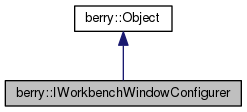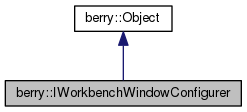|
Medical Imaging Interaction Toolkit
2016.11.0
Medical Imaging Interaction Toolkit
|
|
Medical Imaging Interaction Toolkit
2016.11.0
Medical Imaging Interaction Toolkit
|
#include <berryIWorkbenchWindowConfigurer.h>


Public Member Functions | |
| berryObjectMacro (berry::IWorkbenchWindowConfigurer)~IWorkbenchWindowConfigurer() | |
| virtual SmartPointer< IWorkbenchWindow > | GetWindow ()=0 |
| virtual SmartPointer< IWorkbenchConfigurer > | GetWorkbenchConfigurer ()=0 |
| virtual SmartPointer< IActionBarConfigurer > | GetActionBarConfigurer ()=0 |
| virtual QString | GetTitle ()=0 |
| virtual void | SetTitle (const QString &title)=0 |
| virtual bool | GetShowMenuBar () const =0 |
| virtual void | SetShowMenuBar (bool show)=0 |
| virtual bool | GetShowToolBar () const =0 |
| virtual void | SetShowToolBar (bool show)=0 |
| virtual bool | GetShowStatusLine () const =0 |
| virtual void | SetShowStatusLine (bool show)=0 |
| virtual bool | GetShowPerspectiveBar () const =0 |
| virtual void | SetShowPerspectiveBar (bool show)=0 |
| virtual bool | GetShowProgressIndicator () const =0 |
| virtual void | SetShowProgressIndicator (bool show)=0 |
| virtual Qt::WindowFlags | GetWindowFlags () const =0 |
| virtual void | SetWindowFlags (Qt::WindowFlags windowFlags)=0 |
| virtual QPoint | GetInitialSize () const =0 |
| virtual void | SetInitialSize (QPoint initialSize)=0 |
| virtual void | AddEditorAreaTransfer (const QStringList &transferTypes)=0 |
| virtual void | ConfigureEditorAreaDropListener (IDropTargetListener *dropTargetListener)=0 |
| virtual QMenuBar * | CreateMenuBar ()=0 |
| virtual QWidget * | CreateToolBar (QWidget *parent)=0 |
| virtual QWidget * | CreatePageComposite (QWidget *parent)=0 |
| virtual bool | SaveState (SmartPointer< IMemento > memento)=0 |
 Public Member Functions inherited from berry::Object Public Member Functions inherited from berry::Object | |
| virtual QString | GetClassName () const |
| virtual Reflection::TypeInfo | GetTypeInfo () const |
| virtual QList< Reflection::TypeInfo > | GetSuperclasses () const |
| virtual void | Delete () |
| QDebug | Print (QDebug os, Indent Indent=0) const |
| virtual QString | ToString () const |
| virtual uint | HashCode () const |
| virtual bool | operator< (const Object *) const |
| void | Register () const |
| void | UnRegister (bool del=true) const |
| int | GetReferenceCount () const |
| void | SetReferenceCount (int) |
| void | AddDestroyListener (const MessageAbstractDelegate<> &delegate) const |
| void | RemoveDestroyListener (const MessageAbstractDelegate<> &delegate) const |
| virtual bool | operator== (const Object *) const |
Additional Inherited Members | |
 Public Types inherited from berry::Object Public Types inherited from berry::Object | |
| typedef Object | Self |
| typedef berry::SmartPointer< Self > | Pointer |
| typedef berry::SmartPointer< const Self > | ConstPointer |
| typedef berry::WeakPointer< Self > | WeakPtr |
| typedef berry::WeakPointer< const Self > | ConstWeakPtr |
 Static Public Member Functions inherited from berry::Object Static Public Member Functions inherited from berry::Object | |
| static const char * | GetStaticClassName () |
| static Reflection::TypeInfo | GetStaticTypeInfo () |
| static QList< Reflection::TypeInfo > | GetStaticSuperclasses () |
 Protected Member Functions inherited from berry::Object Protected Member Functions inherited from berry::Object | |
| Object () | |
| virtual | ~Object () |
| virtual QDebug | PrintSelf (QDebug os, Indent indent) const |
| virtual QDebug | PrintHeader (QDebug os, Indent indent) const |
| virtual QDebug | PrintTrailer (QDebug os, Indent indent) const |
 Protected Attributes inherited from berry::Object Protected Attributes inherited from berry::Object | |
| QAtomicInt | m_ReferenceCount |
| QMutex | m_ReferenceCountLock |
Interface providing special access for configuring workbench windows.
Window configurer objects are in 1-1 correspondence with the workbench windows they configure. Clients may use Get/SetData to associate arbitrary state with the window configurer object.
Note that these objects are only available to the main application (the plug-in that creates and owns the workbench).
This interface is not intended to be implemented by clients.
Definition at line 54 of file berryIWorkbenchWindowConfigurer.h.
|
pure virtual |
Adds the given drag and drop Mime types to the ones supported for drag and drop on the editor area of this workbench window.
The workbench advisor would ordinarily call this method from the PreWindowOpen callback. A newly-created workbench window supports no drag and drop transfer types.
Note that drag and drop to the editor area requires adding one or more transfer types (using AddEditorAreaTransfer) and configuring a drop target listener (with ConfigureEditorAreaDropListener) capable of handling any of those transfer types.
| transfer | a drag and drop transfer object |
| berry::IWorkbenchWindowConfigurer::berryObjectMacro | ( | berry::IWorkbenchWindowConfigurer | ) |
|
pure virtual |
Configures the drop target listener for the editor area of this workbench window.
The workbench advisor ordinarily calls this method from the PreWindowOpen callback. A newly-created workbench window has no configured drop target listener for its editor area.
Note that drag and drop to the editor area requires adding one or more transfer types (using AddEditorAreaTransfer) and configuring a drop target listener (with ConfigureEditorAreaDropListener) capable of handling any of those transfer types.
| dropTargetListener | the drop target listener that will handle requests to drop an object on to the editor area of this window |
|
pure virtual |
Creates the menu bar for the window's shell.
This should only be called if the advisor is defining custom window contents in CreateWindowContents, and may only be called once. The caller must set it in the shell using Shell.setMenuBar(Menu) but must not make add, remove or change items in the result. The menu bar is populated by the window's menu manager. The application can add to the menu manager in the advisor's FillActionBars method instead.
|
pure virtual |
Creates the page composite, in which the window's pages, and their views and editors, appear.
This should only be called if the advisor is defining custom window contents in WorkbenchWindowAdvisor::CreateWindowContents(), and may only be called once. The caller must lay out the page composite appropriately within the parent, but must not add, remove or change items in the result. The page composite is populated by the workbench.
| parent | the parent composite |
|
pure virtual |
Creates the tool bar control.
This should only be called if the advisor is defining custom window contents in CreateWindowContents, and may only be called once. The caller must lay out the tool bar appropriately within the parent, but must not add, remove or change items in the result (hence the return type of QWidget). The tool bar is populated by the window's tool bar manager. The application can add to the tool bar manager in the advisor's FillActionBars method instead.
| parent | the parent widget |
|
pure virtual |
Returns the action bar configurer for this workbench window.
|
pure virtual |
Returns the size to use for the window's shell when it is created.
|
pure virtual |
Returns whether the underlying workbench window has a menu bar.
The initial value is true.
true for a menu bar, and false for no menu bar
|
pure virtual |
Returns whether the underlying workbench window has a perspective bar (the perspective bar provides buttons to quickly switch between perspectives).
The initial value is false.
true for a perspective bar, and false for no perspective bar
|
pure virtual |
Returns whether the underlying workbench window has a progress indicator.
The initial value is false.
true for a progress indicator, and false for no progress indicator
|
pure virtual |
Returns whether the underlying workbench window has a status line.
The initial value is true.
true for a status line, and false for no status line
|
pure virtual |
Returns whether the underlying workbench window has a tool bar.
The initial value is true.
true for a tool bar, and false for no tool bar
|
pure virtual |
Returns the title of the underlying workbench window.
|
pure virtual |
Returns the underlying workbench window.
|
pure virtual |
Returns the style bits to use for the window's main widget when it is created. The default is 0.
|
pure virtual |
Returns the workbench configurer.
|
pure virtual |
Saves the current state of the window using the specified memento.
| memento | the memento in which to save the window's state |
|
pure virtual |
Sets the size to use for the window's shell when it is created. This method has no effect after the shell is created. That is, it must be called within the WorkbenchAdvisor::PreWindowOpen() callback.
| initialSize | the initial size to use for the shell |
|
pure virtual |
Sets whether the underlying workbench window has a menu bar.
| show | true for a menu bar, and false for no menu bar |
|
pure virtual |
Sets whether the underlying workbench window has a perspective bar (the perspective bar provides buttons to quickly switch between perspectives).
| show | true for a perspective bar, and false for no perspective bar |
|
pure virtual |
Sets whether the underlying workbench window has a progress indicator.
| show | true for a progress indicator, and false for no progress indicator |
|
pure virtual |
Sets whether the underlying workbench window has a status line.
| show | true for a status line, and false for no status line |
|
pure virtual |
Sets whether the underlying workbench window has a tool bar.
| show | true for a tool bar, and false for no tool bar |
|
pure virtual |
Sets the title of the underlying workbench window.
| title | the window title |
|
pure virtual |
Sets the style bits to use for the window's main widget when it is created. This method has no effect after the widget is created. That is, it must be called within the WorkbenchAdvisor::PreWindowOpen() callback.
For more details on the applicable style bits, see the documentation for Qt::WindowFlags.
| windowFlags | the style bits |